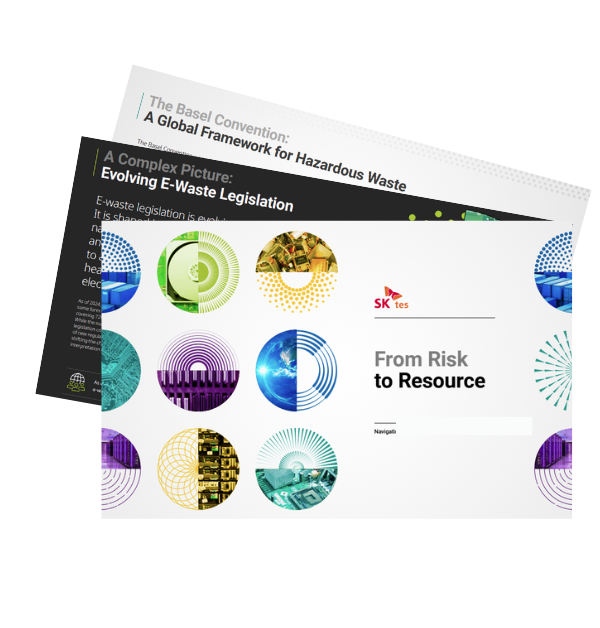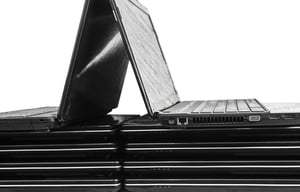The Basel Convention, established in 1989, is a global treaty designed to regulate the transboundary movement of hazardous wastes and their disposal. With 191 signatory parties, it aims to minimize waste generation, ensure environmentally sound waste management, and prevent the dumping of hazardous waste in less-developed nations. The Convention mandates that hazardous waste can only be exported to countries with the capacity to manage it safely, under strict controls.
This blog explains the five key things you need to know about recent amendments to the Basel Convention.
#1: Three Key Updates to E-Waste Regulations Effective January 2025
#2: Global Compliance Challenges and Solutions
#3: The Strategic Role of IT Asset Disposition (ITAD)
#4: Why Partnering with Experts Like SK Tes Is Essential
#5: Maximizing Compliance with Local Recycling Facilities
1. Three Key Updates to E-Waste Regulations Effective January 2025
In January 2025, new regulations under the Basel Convention will take effect, specifically targeting e-waste. These updates stem from the E-waste Amendment adopted at the 15th Conference of the Parties (COP15) in June 2022. The amendments refine definitions, expand the scope of hazardous waste, and introduce stricter controls on the transboundary movement of e-waste.
3 Key changes include:
-
Prior Informed Consent (PIC) Procedure: All cross-border movements of e-waste must now be approved by exporting, importing, and transit countries. This ensures that all parties are aware of and agree to the shipment.
-
Updated Definitions: The definitions of "equipment" and "e-waste" have been refined to include electrical and electronic devices and their components that have reached the end of their useful life.
-
Hazardous and Non-Hazardous Lists: The classification system for hazardous and non-hazardous e-waste has been updated, providing clearer guidance on handling e-waste, especially those components that pose environmental or health risks.
These changes aim to close loopholes that previously allowed e-waste to be shipped for "reuse" or "recycling" and to ensure that hazardous e-waste is managed responsibly.
2. Global Compliance Challenges and Solutions
Navigating the complex landscape of global e-waste regulations is increasingly challenging for enterprises, especially those operating across multiple jurisdictions. Each country has its own rules for classifying, collecting, and managing e-waste, leading to a fragmented regulatory environment. For instance, while the European Union has the Waste Electrical and Electronic Equipment (WEEE) Directive, other regions have their own sets of rules that may not align perfectly.
Compliance requires not just a global understanding of regulations but also local expertise to interpret and implement these rules effectively. Mismanagement of e-waste can result in severe penalties, including fines and reputational damage. Companies must ensure they have the proper permits and adhere to the PIC procedure to avoid legal repercussions.
3. The Strategic Role of IT Asset Disposition
IT asset disposition (ITAD) plays a crucial role in managing e-waste responsibly. ITAD involves the secure and environmentally sound disposal of IT assets, including data erasure, refurbishment, and recycling. By adopting robust ITAD practices, companies can comply with global e-waste regulations, protect sensitive data, and contribute to sustainability goals.
ITAD is not just about compliance; it's also about maximizing the value of retired IT assets. Through refurbishment and resale, companies can extend the life of their devices, reducing the need for new resources and lowering environmental impact. Additionally, responsible recycling of e-waste recovers valuable materials, reducing the need for virgin resource extraction.
4. Why Partnering with Experts Like SK Tes Is Essential
Given the complexities of e-waste regulations and the risks associated with non-compliance, partnering with experts like SK Tes is essential. SK Tes offers comprehensive ITAD services, ensuring that your enterprise remains compliant with the latest Basel Convention regulations. With a global network of owned and operated facilities, SK Tes provides consistent, high-quality service across regions.
SK Tes stands out with its local expertise and deep understanding of regulatory requirements. Their facilities are certified to high standards, such as R2, ensuring environmentally sound practices. By choosing SK Tes, your company can benefit from reduced logistics costs, in-region compliance support, and secure data management.
5. Maximizing Compliance with Local Recycling Facilities
Utilizing local recycling facilities certified to high standards is crucial for maintaining regulatory compliance and minimizing environmental impact. Local facilities reduce the need for cross-border shipments, simplifying compliance with the Basel Convention's PIC procedure. They also ensure that e-waste is managed in an environmentally responsible manner, protecting both health and the environment.
SK Tes operates over 30 R2-certified facilities worldwide, offering the highest standards in IT asset disposition and e-waste recycling. These facilities are equipped to handle a wide range of electronic devices, ensuring that valuable materials are recovered and hazardous components are safely managed. By leveraging local facilities, your enterprise can streamline compliance processes and contribute to a more sustainable future.
In conclusion, the updated Basel Convention e-waste regulations present both challenges and opportunities for global enterprises. By understanding these changes and partnering with experts like SK Tes, your company can navigate the complex regulatory landscape, ensure compliance, and turn responsible e-waste management into a strategic advantage.
Download our guide to Navigating safely through e-waste regulations.
Navigate safely through E-waste regulations [Guide]
Get clear on global e-waste rules - download your guide.

Want to read more on the topic? Here's some other blogs that may be of interest:
Accepting the Global E-Waste Challenge - How Businesses Can Play Their Part
How to Navigate the Ewaste Latest Rule
4 New E-Waste Rules: Basel Convention Proposal to Start in 2025
See how SK Tes can help you today





